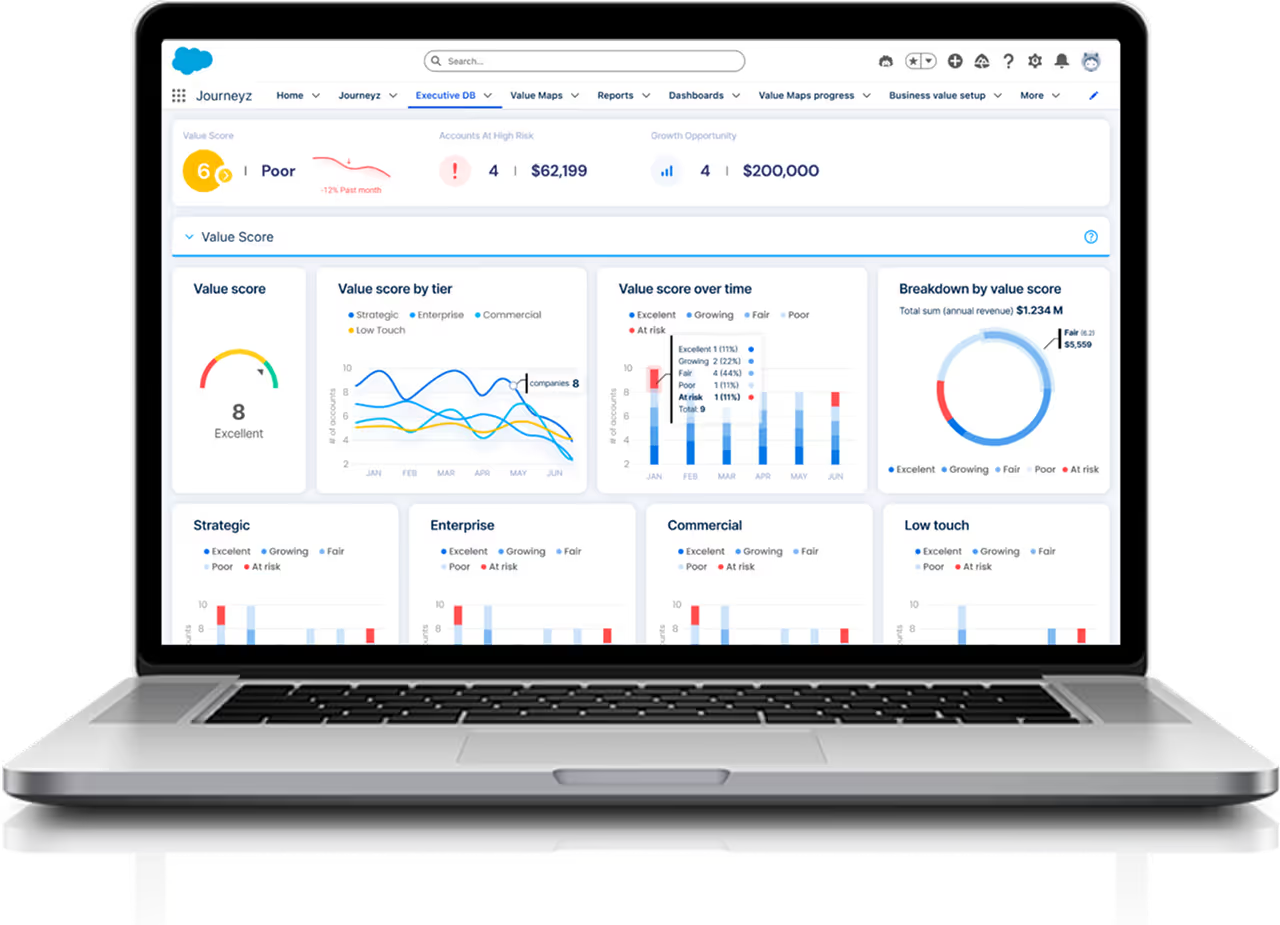The Digital CSM – Transforming SaaS Customer Success for Retention & Expansion
Discover how Digital CSMs are transforming SaaS Customer Success, enabling scalable, personalized engagement and driving retention and expansion through AI-powered insights and automation. Learn about the evolution of Digital CSMs and their impact on customer experience.


The way Customer Success (CS) teams work in SaaS is rapidly changing. The value of customer success to SaaS becomes higher the more complex the product or service. However, the same complexity makes scaling support teams a challenge. Customer Success is increasingly shifting from traditional, high-touch, relationship-focused support designed for enterprise clients to a more scalable, data-driven approach that serves all customer segments effectively.
Today’s customers expect seamless, responsive service, and companies need to deliver this at scale without sacrificing the personal touch that builds lasting loyalty. Enter the Digital Customer Success Manager (Digital CSM)—a key player in modern CS strategy and a cornerstone of any forward-thinking digital customer success program.
According to a recent survey, 61% of customer success professionals expect to use AI in their job by 2024. This reflects the customer success evolution toward automation and digital engagement. The CSM of the future will be a tech-savvy strategist, harnessing AI, automation, and deep customer insights to engage proactively, minimize churn, and accelerate growth. Whether supporting enterprise clients or tech touch segments, Digital CSMs enable companies to scale customer success effectively.
In this article, we’ll delve into the evolving role of Digital CSMs, unpack their expanding responsibilities, and highlight the substantial impact they have on driving SaaS retention and growth.
What is a Digital CSM?
A Digital CSM differs from traditional Saas CSM roles by blending expertise in customer marketing, data analytics, and automation. Focused on managing one-to-many engagements, Digital CSMs automate essential customer interactions for tech touch csm and low-touch csm segments. Unlike traditional CSMs, who focus on one-on-one relationships, Digital CSMs operate programmatically, leveraging customer data to craft strategies that boost engagement and satisfaction on a larger scale.
Digital CSMs enable SaaS companies to implement a customer success strategy that serves all segments efficiently. With this customer success strategy saas compaines are able to scale at a whole new level and pace. Imagine a single CSM empowered by 400 digital counterparts, each customized to meet an individual account’s needs—this vision is rapidly becoming a reality. By automating routine tasks digital CSMs free up the human CSMs time, enabling customer success managers to focus on high touch csm activites and high-value relationship-building.
Key Responsibilities of a Digital CSM
The Digital CSM plays a pivotal role in executing a comprehensive digital customer success strategy, with responsibilities that include:
- Data-Driven Insights: Digital CSMs harness customer data to anticipate needs and deliver continuous value. With advanced AI, they monitor and interpret evolving business goals across accounts and personas, enabling proactive engagement and tailored recommendations.
- Personalized Digital Journey Creation: Digital CSMs craft individualized, data-informed journeys for each customer, moving beyond a one-size-fits-all approach. This allows them to drive engagement and retention across all segments, including tech-touch SaaS accounts.
- Proactive Churn and Upsell Detection: Leveraging predictive analytics, Digital CSMs can identify early signs of potential churn and spotlight upsell and cross-sell opportunities, ensuring that customers extract maximum value from the product.
Aligning Digital CSMs with Customer Success Goals
A key factor in making Digital CSMs effective is ensuring they align with customer goals and pain points. The primary role of customer success management (CSM) is to help customers achieve their desired outcome with a product, ensuring long-term value and engagement. However, as SaaS businesses scale, dedicated customer success managers often struggle to provide high-touch service to every customer. This is where Digital CSMs come in.
By leveraging automation tools, Digital CSMs can support post-sales engagement by identifying customer needs, tracking their progress toward achieving their desired outcomes, and providing timely, data-driven interventions. They help bridge the gap between tech-touch and high-touch accounts, ensuring that all customers receive the right level of support based on their needs.
For SaaS products, a Digital CSM can proactively monitor adoption trends, highlight usage gaps, and provide personalized recommendations to keep customers engaged. This prevents churn while uncovering opportunities for expansion. Instead of waiting for customers to reach out with pain points, Digital CSMs analyze data to predict potential issues and take action before they escalate.
By integrating automation tools with human expertise, SaaS companies can optimize their customer success management (CSM) strategies, ensuring customers receive tailored support at scale. This hybrid approach enables dedicated customer success managers to focus on high-value relationships while Digital CSMs drive proactive engagement, retention, and growth.
Benefits of a Digital Customer Success Strategy
Organizations with digital customer success strategies experience a 30% increase in CS team scalability, allowing them to reach more accounts without expanding their team size. The benefits of a digital customer success strategy go beyond mere scalability:
- Scalability Across Segments: A digital CS strategy empowers SaaS teams to efficiently engage a larger customer base, reducing reliance on high-touch resources.
- Enhanced Efficiency and Cost Savings: By automating routine tasks, Digital CSMs free up CS teams to focus on high-value activities, driving both productivity and cost savings.
- Personalized Customer Experience: Advanced Digital CSMs create tech-touch engagements that mimic high-touch interactions at crucial points, delivering AI-driven, context-specific recommendations that feel personal.
- Data-Driven Opportunity Recognition: Through customer journey analysis, Digital CSMs pinpoint upsell and cross-sell opportunities, allowing CS teams to proactively enhance customer value.
The Evolution of Digital CSMs
The Digital CSM role has evolved dramatically over time. The first generation of Digital CSMs operated on rule-based, templated models, using predefined playbooks applied broadly across customer segments. The downside of this approach, however, was that it created blind spots due to its “one-size-fits-all” nature. Relying on static triggers and minimal automation, this early model offered a generalized but impersonal customer experience that often missed nuanced needs and insights.
Today, advancements in Generative AI (GenAI) and sophisticated data strategies are propelling Digital CSMs into a new era. Unlike their predecessors, these value-driven CSMs automate core CS functions like value realization, product usage insights, and tailored guidance. Next-generation Digital CSMs are now capable of designing fully personalized, dynamic journeys for each customer and persona, moving beyond segment-based playbooks to offer genuinely customer-centric experiences that drive engagement and loyalty.
How Digital CSMs Use Data to Drive Success
Digital CSMs harness a variety of customer communications, such as call transcripts, CRM entries, support tickets, emails, and Slack, to provide a complete view of each customer’s journey. This data enables Digital CSMs to analyze trends, anticipate needs, and enhance value realization.
Key Metrics Tracked by Digital CSMs Include:
- Adoption and Engagement Rates: Measuring how frequently and effectively customers interact with the product, providing insight into user commitment.
- Customer Health Scores: Evaluating the overall health of the customer relationship, based on engagement levels and product usage patterns.
- Value Score: A sophisticated metric that reflects how closely a customer’s product usage aligns with their specific business goals, offering a nuanced view of realized value.
By continuously monitoring these KPIs, Digital CSMs can adjust engagement strategies in real-time, ensuring customers are on track to achieve their goals and maximize product benefits.
Best Practices for Implementing a Digital Customer Success Strategy
For companies embarking on a digital customer success journey, several key practices are essential for ensuring a successful outcome:
- Establish Clear Objectives: Align the digital CS strategy with overarching business goals, such as reducing churn or driving revenue growth.
- Invest in the Right Tech Stack: Provide Digital CSMs with tools that support automation, real-time data insights, and scalable engagement.
- Foster Cross-Functional Collaboration: Strengthen partnerships across sales, marketing, and product teams to deliver a cohesive and seamless customer experience.
- Prioritize Data Readiness: Ensure data accuracy and accessibility so Digital CSMs can leverage insights to deliver personalized, impactful interactions.
The Future of Digital CSMs: Combining AI and Human-Led Success
The future of Digital CSMs lies in seamlessly integrating AI-driven efficiency with human-centered strategies. Advanced AI tools, like GenAI, empower Digital CSMs to deliver precise, personalized interactions that elevate customer success beyond mere scalability. This evolution transforms tech-touch accounts into high-touch experiences at critical moments, creating a new paradigm of meaningful engagement.
Imagine each customer account managed by an AI-powered Digital CSM delivering tailored support, freeing human CSMs to concentrate on strategic relationships. In this vision, the Digital CSM becomes more than a tool for scale—it’s fundamental to high-quality, impactful customer success.
Digital CSMs: the Key to Personalized Journeys at Scale
Digital CSMs are revolutionizing customer success in SaaS, providing a scalable yet highly personalized approach that drives retention and fuels expansion. As businesses grow, Digital CSMs emerge as the foundation of a customer success strategy that’s both proactive and tailored to individual needs.
A true Digital CSM understands that each customer operates with its own distinct set of business values and objectives. By acknowledging and adapting to these unique priorities, Digital CSMs enable fully customized journeys that foster long-term growth and satisfaction. As SaaS companies continue to innovate, Digital CSMs will play an indispensable role in delivering personalization at scale, becoming a central force in sustainable customer success
FAQ
What it the difference between digital-first customer success and digital CSMs?
Digital-first customer success is a strategy that uses automation, AI, and self-service to engage and support customers at scale. It enhances scaled CSM programs by complementing human interactions with digital touchpoints.
Digital CSMs, on the other hand, are AI-powered or semi-automated customer success managers that proactively engage customers, analyze usage data, and trigger retention workflows. They help scale CSM efforts by automating tasks traditionally handled by human CSMs, making them a key part of an efficient customer success model SaaS companies use.
What kind of digital customer success jobs can a digital CSM do?
A digital CSM can handle many tasks to support customer success in SaaS companies, including onboarding automation, proactive customer engagement, health scoring, renewal tracking, and churn prediction. It can also manage scaled outreach, personalized recommendations, and self-service resources, allowing human CSMs to focus on high-value relationships.
Ready to Start your Journeyz?
Transform your customer retention and expansion strategies with the industry’s first Customer Value Platform.

.svg)


.svg)
.webp)




